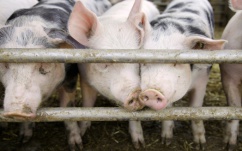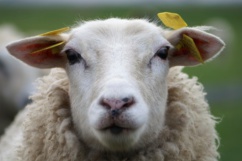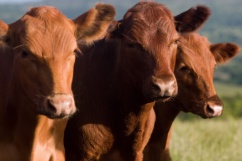Meat
The Great British Tri-Nations Butchers Challenge team are getting ready for this year’s contest.

In preparation for the event, which takes place in New Zealand this September, the six-man team has been taking part in intense practice sessions at Leeds City College and at the Scottish Craft Butchers Awards in Perth, Scotland.
These practice sessions have focused on honing the team’s practical and innovative skills by utilizing an entire lamb and a half side of beef to create a range of products. At the actual event, the team will have to do this, but with a two-hour time limit and in front of a large audience.
David Lishman, Great Britain captain, said the team was keen to be at its best for the upcoming Challenge. “This year’s British team has massive enthusiasm and top-rate butchery skills. Our practice sessions have demonstrated just what a talented group we have, and boosted our confidence to push the Kiwis and Aussies hard for the title.
“Our focus so far has been on developing a theme and the various cuts to highlight exactly what we can do. With a side of beef, side of pork and a full lamb carcass, there is a considerable amount of meat to use and display. Small goods and sausage products are also an important element to the competition, enabling us to showcase the wealth of great expertise in the group.”
The meat industry is at risk of a serious skills shortage, according to the managing director of catering butcher Yorkshire Dales Meat Company, who is calling on the new government to implement a clear strategy when it comes to apprenticeships.
James Knox said he was concerned that there was not enough awareness among young people about apprenticeships, making it tougher for meat companies to recruit the next generation of employees.

According to Knox, there is a general unease across the butchery industry that not enough young people are being attracted into the sector.
Knox said: “I don’t want to be seen to be critical, but I do feel that there was a lack of real, focused and consistent strategy in terms of apprenticeships during the coalition, especially in regards to traditional industries like ours.”
He said Yorkshire Dales employed plenty of skilled butchers in their 30’s or 40’s, but that it lacked that next generation of young, local butchers.
“Part of the problem is that we don’t think people are being told about butchery or other food industry skills as potential career paths or apprenticeships.
“As such, we would encourage the newly elected government to create better strategy and communication around apprenticeships – especially at a local level – to help safeguard the future of industries like ours.”
According to the new Conservative manifesto, the coalition government created 2.2million apprenticeships over the past five years, and the new government said it wanted to create a further three million over the next five years – including trebling the number of food, farming and agri-tech apprenticeships.
The Royal Welsh Agricultural Society (RWAS) Spring Festival in Builth Wells next weekend will host a series of short seminars with the heading ‘Profiting from Pigs’.
The new website will go live in the summer and will include an introduction to Welsh pork production, a directory of pig producers and case studies.

“This new website will form part of our plans to increase awareness of pork suppliers in Wales and the quality of their products,” said Melanie Hughes, HCC’s market development officer. “It will offer producers an opportunity to build their online presence and will be a starting point for customers who are looking to source locally produced pork.
“During the Spring Festival, we will be introducing the website to the industry and recruiting interested producers for the directory.”
Other HCC activities during the weekend will include a programme of seminars, delivered in partnership with Farming Connect and the RWAS. Also held in the pig shed, these sessions will be suitable for large and small-scale producers and will cover topics including pig health, artificial insemination and adding value through direct sales.
Luned Evans, HCC’s industry development officer, said: “The seminars are free to attend and will be an interesting source of information for anyone keen to learn about rearing pigs. Speakers with specialist knowledge of the sector have been invited and will be happy to share their expert advice.”
The Spring Festival will take place on 16 and 17 May at the Royal Welsh Showground.
A new project that aims for genetic improvement in the sheep industry is looking for rams for artificial insemination (AI).
The team behind the RamCompare project is looking for eight rams for the AI section of the project: two Texel, two Charolais, two Suffolk, one Meatlinc and one Hampshire Down.

The RamCompare project was announced earlier this year, with the aim of driving genetic improvement forward through the inclusion of commercial data in genetic evaluations.
Eblex explained that many of the potential AI rams have been identified, and semen that has already been collected from widely used sires is being used where possible. However, some rams are being sent for semen collection.
Samuel Boon, Eblex breeding services manager, said: “This is an exciting phase of the RamCompare project, as we seek to find the rams that will start off the initiative.
“We have been in touch with all registered performance recorded breeders and are confident that the project will move forward with some of the best rams available involved.
”The next stage will be to purchase 24 rams for use by natural mating within the single-sire mating groups in the first year of the trial.
The Butchers’ and Drovers’ Charitable Institution (BDCI) is to offer a £5,000 bursary through Harper Adams University in Shropshire.
The BDCI Bursary is open to all first- or second-year BSc or FdSc students whose course of study has a direct relevance for a future career in the meat and livestock industry.

At postgraduate level, the BDCI Bursaries will be awarded to students entering Harper Adams University to study for PgC, PgD or MSc courses which have direct relevance to the meat and livestock industry.
Preference will be given to those candidates who have family or employment links with the meat and livestock industry or who have an intention of seeking employment in the industry.
The successful scholarship recipients will receive a bursary of up to £5,000 per academic year of full-time study at Harper Adams University.
Ted Hoefling, BDCI treasurer, said: “These awards are a new initiative from BDCI. We hope they will help students who can make a difference in the industry. We are delighted to be working with Harper Adams this year.”
Closing date for applications is noon on 15 June 2015, with the successful applicants decided in July.
The Scottish meat industry has welcomed increased numbers of farmers joining Quality Meat Scotland’s (QMS) Quality Assurance scheme.
QMS reported more than 160 applications from new members have been received since the beginning of the year.

Jim McLaren, Chairman of QMS, said the response to the campaign to drive up membership had been very encouraging and he emphasised the importance of everyone in the industry continuing to work together to reduce the number of businesses which don’t yet benefit from quality assurance.
“Whether you are a farmer, haulier, feed company, auction market operator or a processor, it is vital to the future of these businesses and our industry that everyone is united in support of our whole chain quality assurance,” said McLaren.
As part of the campaign processors and auctioneers encouraging non-assured farmers to become members of the scheme.
The Scottish Association of Meat Wholesalers (SAMW) welcomed the news also welcomed the news.
“Today’s announcement by QMS that 160 new members have applied to join its quality assurance scheme is excellent news for the whole industry, potentially cutting a serious point of “wastage” concerning Scotland’s livestock production,” said Ian Anderson, Executive Manager of the SAMW
“Some SAMW member companies have been writing to any farmers who deliver stock for slaughter without the necessary assurance backing, pointing out how much they are losing in income. These are often good quality animals, finished in Scotland but unable to be sold under any of the quality assured Scotch brands. Members have pointed out that the lack of the necessary assurance is a complete waste of precious resources and it is good that the message appears to be getting through.”
Meanwhile QMS have reviweed the membership fees for the scheme, resulting in farms with smaller numbers of animals have been reduced and the fees for farms with large numbers of cattle and sheep have increased slightly to offset this.
Scientists at the Massachusetts University of Technology (MIT) have created a sensor which detects gases emitted from rotting meat, which could help to reduce food waste.
With food waste a hot topic, the scientists behind the sensor said it could be used on ‘smart packaging’, enabling consumers to accurately tell when meat has gone off.

/>
Speaking to the journal Angewandte Chemie about the sensor, Timothy Swager, the John D MacArthur professor of chemistry at MIT, said: “People are constantly throwing things out that probably aren’t bad.”
The sensor was modelled on a similar device used to measure the ripeness of fruit. It uses carbon nanotubes that have been chemically modified to be able to carry electric current changes in the presence of a particular gas – putrescine and cadaverine in decaying meat.
Researchers said a regular smartphone, using software developed by Swager’s lab, could read outputs from the sensor.
The technology has been welcomed by Roberto Forloni, senior science fellow at Sealed Air, supplier of food packaging. “There are several potential advantages in having an inexpensive sensor for measuring, in real time, the freshness of meat and fish products, including: preventing foodborne illness; increasing overall customer satisfaction; and reducing food waste at grocery stores and in consumers’ homes,” said Forloni.
Halal meat brand Ghanim International UK has extended its range of frozen, microwavable products in Tesco.
Ghanim International UK has launched its ‘Chilli Nacho Chicken Drumstick’ and ‘Garlic Butter Chicken Kiev’ in over 42 Tesco stores, as part of its Brunei Halal range.

The company said combining quality-assured British meat with innovative products, while meeting the needs of second- and third-generation Muslim consumers, was a key focus.
Dr Mohammad Nazir OBE, CEO of Ghanim International UK, began talks with senior management at Tesco more than a year ago and has seen the partnership flourish, with the range now being expanded into chilled products.
“We responded to Tesco’s challenge for more innovative products.
“Our brand has been recognised as having strength by sourcing British local produce and a high level of halal integrity, quality and presentation. I feel really excited that Tesco has been able to see our vision in reaching out to the second- and third-generation Muslim consumers in the UK,” Nazir commented.
Meanwhile, Ghanim International UK said Tesco was “striving to offer complete halal assurance, to ensure there is quality and traceability from farm to family”.
Crawshaws Butchers saw sales rise 17% in the year ending 31 January 2015, helped by a new site opening.
The company’s year-end results to the end of January revealed that total group sales rose from £21 million (m) in 2014 to £24.6m, with profit before tax standing at £1.2m.

Average customer spend has continued to rise, according to Crawshaws, up 3.5% to £6.22 versus last year. The company explained that this was down to a focus on larger value packs and multi-buy offers. Customer numbers are 3.2% higher than last year “driven by our hot cooked products as we improve the range and consistency of our lunchtime and take-home offer”, the report added.
Chairman Richard Rose said: “I am pleased to say that, in November, we moved from three separate head office and factory locations into one newly refurbished facility in Rotherham. This single location can now support up to 60 shops and also contains a new factory shop, which is performing well above expectations.”
Crawshaws Butchers has 22 retail outlets, as well as a manufacturing and distribution centre, across Yorkshire, Humberside, Nottinghamshire and Lincolnshire.
The company said: “In line with our growth strategy, we have now successfully launched 10 new shops in Retford, Castleford, Chesterfield, Mansfield, Huddersfield, Doncaster, Bramley, Derby, Sheffield and, more recently, a factory shop at our head office site in Rotherham.”
Crawshaws has a plan to open 200 shops, and Rose added: “The post-year-end acquisition of Gabbotts Farm has provided 11 additional profitable shops and a distribution centre in the north west of England. We have also recently signed leases on new shops in Leeds and Bolton, which are currently being fitted out. In addition, there are a number of other locations in the process of being signed up.”